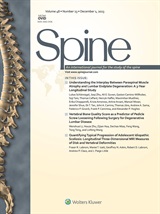
Adjuvant Topical Tranexamic Acid in Decompressive Spinal Metastasis Surgery

Adjuvant Topical Tranexamic Acid in Decompressive Spinal Metastasis Surgery
Adjunctive Topical Tranexamic Acid for Blood Salvage Does Not Reduce Postoperative Blood Loss Compared with Placebo in Patients Who Undergo Palliative Decompressive Spinal Metastasis Surgery: A Randomized Controlled Trial
Spine (Phila Pa 1976) . 2022 Feb 1;47(3):187-194.Did you know you're eligible to earn 0.5 CME credits for reading this report? Click Here
Synopsis
Sixty five patients undergoing decompressive thoracolumbar spinal metastasis surgery were randomized to receive topical intraoperative tranexamic acid (TXA, n=33) or placebo (n=32). All patients received perioperative IV TXA. The primary outcomes of interest were intraoperative and postoperative blood loss, transfusion rates and overall complications. There was no difference in blood loss or trans...
To view the full content, login to your account,
or start your 30-day FREE Trial today.
FREE TRIAL
LOGIN
Forgot Password?
Explore some of our unlocked ACE Reports below!

Learn about our AI Driven
High Impact Search Feature
Our AI driven High Impact metric calculates the impact an article will have by considering both the publishing journal and the content of the article itself. Built using the latest advances in natural language processing, OE High Impact predicts an article’s future number of citations better than impact factor alone.
Continue



 LOGIN
LOGIN

Join the Conversation
Please Login or Join to leave comments.